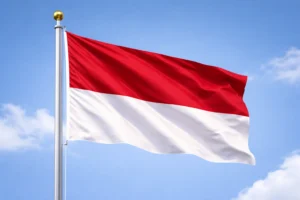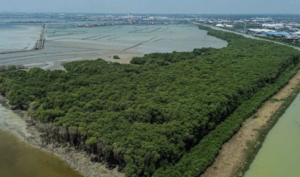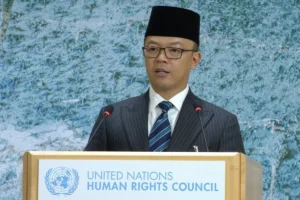President Prabowo Evaluates Free Nutritious Meals Program in Cabinet Meeting

Jakarta, The Gulf Observer: Cabinet Secretary Teddy Indra Wijaya announced that President Prabowo Subianto convened a meeting on Sunday evening to evaluate the implementation of the Free Nutritious Meals (MBG) program. The meeting, held at the President’s private residence on Jalan Kertanegara, Jakarta, was attended by several ministers of the Red and White Cabinet.
“One of the topics discussed was the MBG program, including its implementation and several evaluations to ensure it runs smoothly and achieves its targets,” Wijaya stated on Monday. He noted that the Head of State gave direct and highly detailed technical instructions on the program’s execution, emphasizing discipline, procedures, and food safety standards, particularly cleanliness.
The two-hour meeting, which took place immediately after President Prabowo’s return from an overseas trip, underscored his commitment to personally monitoring government programs, even outside of official working hours.
According to Wijaya, discussions extended beyond the MBG program to include other strategic priorities such as food security, public health, energy, maritime affairs, the Fishermen’s Village initiative, Village Cooperatives, and the construction of the North Java Sea Wall.
The Ministry of Agriculture and the Head of the State Logistics Agency (Bulog) reported that national rice reserves remain sufficient. Meanwhile, the Minister of Health highlighted the progress of the free health check-up program, which has reached approximately 36 million beneficiaries.
The evaluation also came against the backdrop of food safety concerns related to the MBG program. The National Nutrition Agency (BGN) reported last week that between January and September 2025, a total of 70 food safety incidents, including poisoning cases, affected 5,914 MBG recipients.
Investigations identified several bacterial contaminants as primary causes, including Escherichia coli in water, rice, tofu, and chicken; Staphylococcus aureus in tempeh and meatballs; Salmonella in chicken, eggs, and vegetables; and Bacillus cereus in noodles. Contaminated water sources were also found to contain coliform, Proteus, Klebsiella, and PB bacteria.


